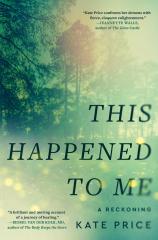This Happened to Me: A Reckoning
Review
This Happened to Me: A Reckoning
In 2022, the Boston Globe published an article titled “Kate Price Remembers Something Terrible,” which detailed an explosive case of child trafficking that its reporter, Janelle Nanos, had spent 10 years researching. In THIS HAPPENED TO ME, Price tells her own story for the first time. Her memoir is a harrowing testament to the power of resilience and survival, but also a galvanizing call to action and a cutting reminder of the ways that privilege blinds us to uncomfortable truths.
To understand Price’s childhood in a small mill town in central Pennsylvania, just at the northernmost reaches of Appalachia, you first must understand mountain culture. Set against the glorious backdrop of mountain sunrises and sunsets, life in Appalachia is one of "us versus them." Many towns, like the one Price called home, are abandoned by coal mine owners and landowners who have exploited generations’ worth of families. Alcohol and drug abuse become rampant, not because of some heady bacchanalia, but because of the pain of manual labor and the hopelessness of poverty. Economic instability renders things like higher education useless at best and a betrayal of your family at worst. As it happens, women are often oppressed and subjugated, as society’s patriarchal undertones are amplified by the lack of, well, everything.
It is not uncommon, as Price details in her family tree, to have generations of untimely deaths: from domestic violence, insanity or addiction. Price’s own family history reads like the stuff of fiction. When her grandmother died of a burst ovarian cyst, it was chalked up to “women problems” and promptly banned from conversation --- this after her own 16-year-old daughter, Price’s mother, found her dead in bed.
"[THIS HAPPENED TO ME] is a harrowing testament to the power of resilience and survival, but also a galvanizing call to action and a cutting reminder of the ways that privilege blinds us to uncomfortable truths."
So it is that Price is born to a shy, lonely woman who dreamed of going to college. But she was forbidden by her father due to her “good job” at a textile factory and a violent, angry man raised in the Bloody Third ward, a barbaric part of town named for the fact that men showed up to their mill jobs on Monday mornings covered in bruises and gashes from the brawls that spilled out over the weekend. Although Kate and her sister, Sissy, enjoyed family trips to the Fair, church visits with their neighbor, and unlimited access to books thanks to their local library, this was about the extent of their peace and joy.
At home, a different dynamic emerged: one of an angry father coming home already swinging, of hiding in musty closets to avoid his pummeling, and, for Price, of an early realization that agreeing she was bad, terrible and unworthy didn’t stop the beatings, but only made them shorter. We now know what this kind of internalizing can do to one’s psyche, but for four-year-old Price, it was the only way to survive.
These beatings hid an even darker secret. Most nights, Price would awaken to her father excitedly telling her to get dressed because they were going to a party. He then would rub her arm with alcohol and deliver an injection or fill her mouth with a peacock-green liquid before dragging her into his truck and off to…who knows where. Thankfully, Price never maintained consciousness. These special nights, he told her, were reserved for “perfect little girls” --- the special ones, the ones who get to touch and be touched, pose in lingerie and be photographed in Polaroids.
Each morning following one of these so-called “parties,” Price could only remember vague snapshots: the sound of the truck rolling over gravel, the smiling faces of men dressed in “church clothes,” the ache between her legs. Crippled by shame and lacking the vocabulary to even describe what was happening, she kept quiet. After all, in Appalachia, certain things are “family matters” not to be discussed in public.
When Price’s father eventually leaves the family (only when both his daughters have reached puberty; I’ll let you decipher that), a teenage Price seems to have been saved. Price’s mother is doting and loving, always happy to sacrifice her time and money to ensure that her girls never go without. But for Price, who already shows signs of great intelligence, her mother dreams of academic achievement, a life of higher education, a Master’s, a PhD. Already accustomed to a pressure-cooker lifestyle, academia comes easily for Price. But even as she travels to Cambridge, Massachusetts, her past continues to hold a dark, dangerous grip on her.
Beyond the obvious --- a struggle to date and enjoy normal sexual relations with men --- Price grapples with her feelings of unexplainable grief and hazy flashbacks. Though she has never critically examined her relationship with her father, her work with a trauma specialist (Dr. Bessel van der Kolk, whose book, THE BODY KEEPS THE SCORE, details some of his work with Price) who specializes in EMDR therapy eventually opens the floodgates. Not only was Price abused by her father, she also was shared and sold by him.
Decades of difficult, painful therapeutic work eventually allow Price to acknowledge her past, but then comes life: her mother’s cancer diagnosis, a falling-out with Sissy, and her Appalachian-born fear of never finding a husband and having children. All the while, her father (now on his third wife) continues to crop up, never taking accountability and always reminding her of the mountain mantra that “family is family.” As Price navigates all of this and more, she starts to investigate her small town and its relationship to her father. Who knew what he was doing to his family? Who were the men whose shiny belt buckles and whiskered faces populate her flashbacks? And, above all, how can she turn all of this pain and agony into something more powerful, something that prevents another child from the same fate?
Any memoir reader will tell you that it's one thing to have a good story, but it’s another thing entirely to be able to write it well: clear-eyed and unflinching, reflective and thoughtful. Kate Price --- whose story is not just unforgettable, but utterly haunting --- does all of this and more. Though she tells one of the most painful, tragic stories I have ever read, her aim here is not to shock you, but rather to inform you of the realities of child sexual abuse in our country. Drawing on her work as a research scientist studying child sex trafficking, Price’s gaze is not just introspective, but intersectional. She frequently pauses to acknowledge her privilege --- her story, she notes, would not have garnered the same attention if she was not white, blonde-haired and blue-eyed.
As its subtitle suggests, THIS HAPPENED TO ME is, indeed, a reckoning. But as Price details her life growing up in Appalachia --- where “neighbor” is a verb, and education is a threat --- it is also a betrayal: of her upbringing, which dictated that women were wives and mothers, not individuals; of her friends and family, whose mistrust of outsiders prevented them from telling family secrets; and of her own parents, one half of whom enacted her abuse, while the other half turned a blind eye. But it is Price’s steadfast commitment to advocacy, to ensuring that no child endures the abuse, assault and trafficking that consumed her childhood, that cancels out this betrayal and places the emphasis on “Reckoning” with a capital R.
Reviewed by Rebecca Munro on August 15, 2025
This Happened to Me: A Reckoning
- Publication Date: August 5, 2025
- Genres: Memoir, Nonfiction
- Hardcover: 336 pages
- Publisher: Gallery Books
- ISBN-10: 1668036223
- ISBN-13: 9781668036228




